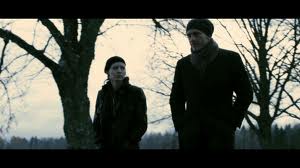 The much-anticipated American adaptation of Stieg Larsson’s novel (or remake of the Swedish film version, depending on how you look at it), The Girl With the Dragon Tattoo finds director David Fincher in fine form, returning to the dark, twisted pulp that he does so well but hasn’t touched since Zodiac in 2007 and Seven in 1997. Like those films, Dragon Tattoo is a seedy tour de force.
The much-anticipated American adaptation of Stieg Larsson’s novel (or remake of the Swedish film version, depending on how you look at it), The Girl With the Dragon Tattoo finds director David Fincher in fine form, returning to the dark, twisted pulp that he does so well but hasn’t touched since Zodiac in 2007 and Seven in 1997. Like those films, Dragon Tattoo is a seedy tour de force.
For the uninitiated who haven’t read Larsson’s saga or seen the previous film adaptations, the story (set in Sweden) focuses on two characters: Mikael Blomkvist (Daniel Craig), an investigative journalist who was manuevered into a libel lawsuit and disgraced by a sleazy financier; and Lisbeth Salander (Rooney Mara), a sullen and deeply troubled young hacker and ward of the state. Mikael is hired by wealthy industrialist Henrik Vanger (Christopher Plummer) to unravel the mysterious disappearance of his niece, Harriet, whom Vanger believes was murdered by a family member decades earlier.
Lisbeth, meanwhile, has been in and out of institutions since age 12, after suffering years of physical and sexual abuse. When a stroke incapacitates her parole officer, she is placed under the supervision of one who turns out to be nothing more than an depraved predator. By the time her story merges with Mikael’s about an hour into the movie, she’s exacted revenge and finally taken the control of her life that she’s sought for years.
No doubt a lot of eyebrows were raised when Fincher opted for Mara (who previously worked for him in The Social Network) over big-name actresses like Scarlett Johansson and Carey Mulligan. It turned out to be a shrewd decision on his part; Mara is an amazing discovery who steals the spotlight from a truly stellar cast that also includes Stellan Skarsgard and Robin Wright. An avenging goth-punk angel, she deftly expresses both Lisbeth’s fierceness and her fragility. (It doesn’t hurt that Mara’s is the meatiest role, or that the script was by Oscar-winning screenwriter Steve Zaillian.)
Fincher’s signature style is there from the very moment the H.R. Giger-esque opening credits roll, though he wisely dials it down enough to allow Larrson’s intriguing tale carry itself. Unlike the previous film version, Fincher’s doesn’t tone down the brutality or the sex found in the novel, and though that may seem salacious at first, it greatly raises the stakes in terms of story and characterization. The score by Trent Reznor (who won an Oscar last year for similar work for Fincher on The Social Network) compliments cinematographer Jeff Cronenweth’s frostbitten images of the Swedish landscape.





